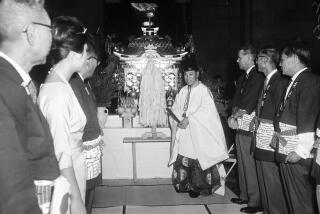Crossing the line
- Share via
THE GRACEFUL SIMPLICITY of the towering cross atop a San Diego hill belies its convoluted history. It starts with a small wooden cross erected on the city-owned hill nearly 100 years ago, apparently for Easter sunrise services. Atop 822-foot Mt. Soledad, there is little to block the first rays of the sun.
Over the years, crosses were vandalized or blown down and replaced; the current version was erected in 1954. It is a striking sight, visible from Interstate 5 and surrounded by an imposing spiked-top fence.
In 1989, a veteran and atheist filed suit against the city of San Diego, contending that the cross amounts to a 43-foot-tall constitutional violation. Lawyers for the city have long said the current cross is a war memorial, though some maps continue to refer to it as the Mt. Soledad Easter Cross. And any references to veterans or lost soldiers were not present at the site when the suit was filed. In the years since, as the plaintiff has won every significant legal decision, the cross has been the subject of three voter referendums, countless municipal and federal resolutions and endless debate.
In the end, none of this matters. Whether viewed as a war memorial, an icon or a place of worship, the cross is an extremely visible symbol of one religion. It occupies arguably the most prominent piece of public real estate in the city, which is in a state where the Constitution is even more exacting than the U.S. Bill of Rights about the separation of church and state. California’s “no preference” clause explicitly prohibits the government from giving any preferential treatment to a particular religion, which is mainly why federal courts have ruled repeatedly that the cross must go. Even seen as a public war memorial, it is lopsided, honoring only those members of the armed forces who belonged to a particular faith.
The city’s attempts to sell the land so a private group could keep the cross have not fooled the judges. The decision to sell just the tiny patch under the cross, and not to open the sale to the public at large but solely to groups that would retain the cross, amounts to preferential treatment, the courts ruled.
Last week, U.S. Supreme Court Justice Anthony M. Kennedy gave the city a reprieve, saying it could keep the cross until the case has worked its way through the legal system. A judge had ordered San Diego to pay a $5,000-a-day fine if it didn’t remove the cross by Aug. 2.
Kennedy’s order is reasonable enough; the U.S. 9th Circuit Court of Appeals is scheduled to hear arguments in mid-October. A delay of a few months in a case that has dragged on for 17 years is not a hardship. The high court has refused twice to hear this case, though it may agree to hear an appeal in the fall. But it is abundantly clear -- from court proceedings, legal history and to any passing motorist on I-5 -- that the cross on Mt. Soledad represents an unacceptable establishment of religion on public land.
More to Read
Sign up for Essential California
The most important California stories and recommendations in your inbox every morning.
You may occasionally receive promotional content from the Los Angeles Times.













